The Comic Destiny Read online
Also by Ben Okri
FICTION
Flowers and Shadows
The Landscapes Within
Incidents at the Shrine
Stars of the New Curfew
The Famished Road
Songs of Enchantment
Astonishing the Gods
Dangerous Love
Infinite Riches
In Arcadia
Starbook
The Age of Magic
The Magic Lamp
The Freedom Artist
ESSAYS
A Time for New Dreams
Birds of Heaven
A Way of Being Free
The Mystery Feast
POETRY
An African Elegy
Mental Fight
Wild
Rise Like Lions (Anthology)
PLAYS
The Outsider
THE COMIC DESTINY
Ben Okri
www.headofzeus.com
First published in the UK in 2009 by Rider, an imprint of Ebury Publishing, under the title Tales of Freedom
This updated paperback edition published in the UK in 2019
by Head of Zeus Ltd
Copyright © Ben Okri 2009, 2019
The moral right of Ben Okri to be identified as the author of this work has been asserted in accordance with the Copyright, Designs and Patents Act of 1988.
All rights reserved. No part of this publication may be reproduced, stored in a retrieval system, or transmitted in any form or by any means, electronic, mechanical, photocopying, recording, or otherwise, without the prior permission of both the copyright owner and the above publisher of this book.
This is a work of fiction. All characters, organizations, and events portrayed in this novel are either products of the author’s imagination or are used fictitiously.
9 7 5 3 1 2 4 6 8
A catalogue record for this book is available from the British Library.
ISBN (PBO): 9781788549653
ISBN (E): 9781788549646
Typeset by Adrian McLaughlin
Cover images: Shutterstock
Printed and bound in Great Britain by
CPI Group (UK) Ltd, Croydon CR0 4YY
Head of Zeus Ltd
First Floor East
5–8 Hardwick Street
London EC1R 4RG
WWW.HEADOFZEUS.COM
‘God is a comedian performing
to an audience too afraid to laugh.’
VOLTAIRE
Contents
Acknowledgements
Introduction
T he Comic Destiny
A Note on the Form
Belonging
The Mysterious Anxiety of Them and Us
The Clock
Music for a Ruined City
The Unseen Kingdom
The Racial Colourist
The Black Russian
Wild Bulls
The Legendary Sedgewick
The Golden Inferno
The Secret Castle
The War Healer
The Message
An Invitation from the Publisher
Acknowledgements
Material in this collection has been previously broadcast or first published as follows:
‘Belonging’ first broadcast by the BBC and published in Ode Magazine; ‘The Mysterious Anxiety of Them and Us’ first broadcast by the BBC and published in Global Report; ‘Music for a Ruined City’ published by Ode Magazine; ‘The Racial Colourist’ published in VSO Magazine; ‘The Black Russian’ published in Diaspora City (Arcadia Books, 2003); ‘Wild Bulls’ published in The London Magazine; ‘The Golden Inferno’ published in Ode Magazine; ‘The Secret Castle’ first broadcast by the BBC; and ‘The War Healer’ published in The Spectator.
Introduction
Originally this book was published under the title Tales of Freedom.
The thirteen tales that come after ‘The Comic Destiny’ are stokus. The stoku is a new prose form. I went through a long period trying to find the smallest unit of fiction. The smaller I went the more I entered the realm of poetry. I sought the smallest unit of poetry and found the haiku. There are smaller units, but the haiku combines quantum essence with cultural force. I dreamt of an alchemy of story and haiku.
To write a story and preface it with a haiku seemed too obvious. I wondered if it weren’t possible to have both in one form, the suggestiveness of the haiku implied in the story. I chose not to be bound by the seventeen syllables and the three line spread of the technical haiku, but to have the implications, the weather, the lightning flash, and the spiritual provenance of the haiku itself. After all it was also an ancient tool to free the mind from illusion.
There are thirteen stokus in this book. If you operate on base twelve, the duodecimal system, thirteen becomes the number of liberation.
The stokus are short, so the reader can be forgiven for thinking they were easy to write. Each one is a sculpting that took a lot of time to find its form. Small things require more care.
All the stories in this book are in some way about freedom. They look at freedom from many angles, beginning with the freedom of form. But form is never wholly free. It must be crafted and discovered after much searching. The freedom of form here is the freedom from previous forms. Finding new ways to say new things. I sought a new way to tell each story.
The first story, and the longest, is ‘The Comic Destiny.’ It is important to me, in itself and what it yielded, the worlds it made possible.
It was written more than thirty-five years ago, in another form. I had found a language of humour, simplicity, and mischief. I was my own little Dadaist, upending in a nonsense tale nonsense tales themselves and arriving at a new destination. My art had to ripen before I could transform it.
‘The Comic Destiny’ contains the alchemical tincture that infuses The Famished Road. It is, in a way, the impish, indirect instigator of The Famished Road. If I had not written the one, I would never have written the other. The tincture, implicit in the faculty of imagination, is none other than freedom itself.
The story though is more than an instigator. It stands in its own mysterious light and contains themes that continue to preoccupy me.
Our destiny and destination is comic. The nature of that comedy depends on one’s perspective. If our destination is the grave, then all the seriousness with which we approach life is comic. If our destiny transcends the grave, then all the solemnity with which we approach life is comic. It is comic either way.
I kept ‘The Comic Destiny’ as a talisman for nearly thirty years. But I could not keep it forever. The time came when I had to give it away. Perhaps we keep things most when we give them away.
May a new incarnation make a new destiny for this book in the world.
BEN OKRI
Little Venice, London, 2019
The Comic Destiny
Book One
One
Old Man and Old Woman sat in the forest. Pinprop sat at their feet. They were in a clearing. They listened to footsteps running in their direction, and to a siren wailing in the distance. After a while the footsteps receded.
Old Man and Old Woman were silent. They sat behind a table. Pinprop sat in front. Every now and again Pinprop looked to the left and then to the right. He put his ear to the ground. He grinned.
Suddenly, Old Man, with dignity, said:
‘YES.’
Old Woman looked at him. Then she too said:
‘Yes.’
There was a long silence. Not even the wind could be heard. Old Man kicked Pinprop beneath the table and, sternly, said:
‘Pinprop!’
Pinprop sat up straight and came to his senses.
‘Oh, sir,’ he said. ‘Definitel
y yes. Indeed, sir. A big yes.’
‘Good. Good,’ Old Man said.
Two
Pinprop leapt up from his cross-legged position as if inspired. He paced up and down the clearing, in front of the table. He stopped, and laughed. Then he performed a dance step, turned grim, and laughed again. Without turning to face the old couple, he said:
‘As we were saying. We have indeed found the spot, and the spot has indeed found us. We have not yet arrived, but every point at which we stop requires a re-definition of our destination.’
‘You mean we have not yet arrived?’ said Old Woman, with a tone of indignation.
‘Oh, yes,’ replied Pinprop. ‘But only tentatively.’
‘What!’ Old Woman cried.
‘It’s like this,’ said Pinprop reassuringly. ‘Every time a goose lays an egg it implies many more eggs to be laid. Every time a trap catches a mouse there is an intimation of many more mice to be caught. The final destination of the goose is when it can become an egg; and with the trap it is when it ends up as a mouse.’
‘Yes,’ Old Woman said. ‘That makes a lot of sense. Go on.’
Pinprop resumed pacing. He appeared slightly confused.
‘I’m glad it makes sense.’
‘Well, go on.’
‘Well, em, where was I?’
‘The mouse becomes a trap,’ Old Woman said, irritated.
‘Yes. Where was I before that?’
‘You were here, you fool,’ Old Man snapped.
‘That’s right,’ said Pinprop. ‘How easily I forget. Well, now that we have arrived temporarily, we must pay our tributes to where we are.’
Three
Pinprop became silent. Then he looked around wildly. There was a touch of terror on his face.
‘Where are we?’ he asked.
‘Pinprop, will you stop this,’ Old Woman said, exasperated. ‘You were just going to tell us that.’
‘No, madam,’ replied Pinprop. ‘I was simply going to remind us what brought us here.’
‘And what is that?’ Old Woman asked, with some interest.
‘Well, em, do you want me to be honest?’
‘No, definitely not, Pinprop,’ Old Man said, ‘You know how much we hate honesty.’
‘That’s what I thought.’
‘Well?’ pressed Old Woman.
‘Well then,’ said Pinprop blithely, ‘we came here because we were looking for somewhere else to go.’
‘That is disconcertingly too near the truth,’ said Old Man.
‘Well then, we came here because we were tired.’
‘Still too near the truth.’
‘We came in search of violence?’
‘Too near.’
‘Looking for a place to die?’
‘PINPROP!!!’ Old Man cried.
‘Forgive me, sir. It simply slipped out.’
‘Well then, rectify it.’
‘Definitely, sir.’
‘Don’t use that word “definite”.’
‘Why not, sir?’
‘Blasphemy!’
‘Alright, sir.’
‘Then why?’ asked Old Woman. ‘Why? Why? Why, Pinprop?’
‘Yes, why? Emmmm. Can I be verbose about it?’
‘Certainly,’ said Old Man.
‘Ugliness,’ began Pinprop, ‘and the cruelty of myth. The excessive stench of putrefying bodies. Too much blood and tiredness, and iron in the throat. Small places turning septic, and large spaces tumbling into confusion. And people becoming hell. And hunger bloating too many bellies. Tiredness and tiredness and chaos. And fear, Sir, limitless fear.’
‘You should be hanged, Pinprop,’ snarled Old Man.
‘Too much neurosis and disease and new diseases.’
‘You should be flagellated, Pinprop,’ snarled Old Woman.
‘And the shrinking of cages till we can no longer fly.’
‘You should be served for dinner,’ Old Man cried.
‘And squabbles and lies and terror. Self-destruction and the wilful destruction of other people. And sickness, sir, sickness in the throat and stomach and food and streets and faces and the air…’
Cutting through his iteration, Old Man and Old Woman shouted as one:
‘The chain, Pinprop, the chain of iron and blood.’
‘Oh, yes,’ said Pinprop, a little chastened. ‘I forgot. I got carried away.’
With a noticeable change in their voices, and still speaking as one:
‘Yes, Pinprop, you got carried away.’
‘What?’ he enquired, puzzled.
‘Yes!’
‘Oh, indeed, yes,’ said Pinprop, relieved. ‘Yes very very much. A fat yes to everything.’
He laughed. He seemed pleased with himself. He did a dance step.
‘Yes, Pinprop. Yes,’ they both said, with a decidedly sinister tone.
Four
Then, quite suddenly, Old Man and Old Woman kicked away their chairs and tossed aside the table. And while Pinprop danced unsuspectingly they grabbed him and, with surprising ease, lifted him up and carried him off into the woods. They dumped him on the ground with a thud. Pinprop wailed and laughed wildly at the same time, while they chained him. Then, wheezing and coughing, Old Man and Old Woman returned to the clearing.
Breathing heavily, Old Man said:
‘That was a job well done.’
‘A satisfactory achievement,’ Old Woman replied.
‘A major victory, considering our ages.’
‘Let us not talk about age.’
‘I’m exhausted.’
‘Do you think we were a bit too hard on him?’
‘Definitely,’ said Old Man, with dignity.
‘That’s wonderful.’
They picked up the chairs, put the table back in its former place, and resumed their seats.
‘Now all we can do is wait,’ Old Woman said.
‘Yes.’
‘And the boredom?’
‘Oh, that. Let’s enjoy that as well.’
‘Ah, yes.’
‘Yes to all that.’
‘Yes to everything.’
‘And to nothing.’
Five
There was a brief silence. Then Old Man and Old Woman began to reminisce, to speak as if the other weren’t there. They spoke aloud, to themselves, in that clearing, in the forest, beneath an indeterminate sky. They spoke alternately, as if they were in a dream, or a trance, or a ritual. Old Woman spoke first.
‘I remember all those signs on the trees on our way here…’
Then Old Man spoke:
‘I forget to remember but I certainly recollect the skeletons that strange tribe built their houses with…’
Old Woman, interrupting, said:
‘And I remember that the signs formed an interminable sentence. If you miss out a tree or get to the wrong one first the whole sentence gets jumbled up.’
Old Man continued the thread of his reminiscences:
‘The skeletons were polished and left intact. The bones were decorated. The hollows in the skulls were stuffed with amusing artefacts. The tribe thought it had finally arrived and then one night in history the owners of the skeletons turned up and began to remove their bones and skulls. The buildings collapsed, and only the artefacts remained.’
Old Woman, increasingly mesmerised by her reminiscence, spoke with some urgency:
‘I remember that I had to keep rearranging the sentences in my head. At first they seemed like nonsense, a pointless word puzzle. I was fascinated with this elaborate rubbish till I realised that I was in fact reading the story of my life that had been scattered all over the place.’
They were each lost in their separate monologues. They picked up the thread of their reminiscences as if they were sleepwalkers in an obscure theatre of the mind. With increasing intensity, Old Man continued:
‘The strange tribe had built an unhealthy routine around the skeletons. They didn’t realise that the skeletons were alive and subversive. Their routine
s became hellish and the people became afflicted with diseases that only a final destruction could cure. I mean, it was funny and sad to see them living their daily lives, trying to unwind the intricate confusion of so many threads forever entangled. It was even funnier when…’
And Old Woman, in the voice of a bizarre tropical bird, swooped down into her extended act of memory.
‘I was horrified but I laughed and said to Pinprop “There must be a place out there”. And whenever I could I either tore down the signs or rewrote them. It was ugly seeing intimate details of my life on those trees, things like when I had my first period and all the satisfaction I derived from inflicting revenge on someone who had insulted me in some small way. It was all so banal. I rewrote them, indeed I did. And…’
Plunging deeper into his mood, Old Man said:
‘… a man came along and saw his skeleton embedded in the body of a building. He struggled so hard to get it out that he extricated the skeleton but ended up part of the building himself. Afterwards the building became empty because they thought it was spooked and for several centuries the man was howling away in an empty house with no-one around to be terrified. And…’
Old Woman laughed lightly to herself at her memories.
‘… I thought it was funny myself that I had rewritten the last sign I saw that said “And I was lost”. I simply made it read: “And I took up a room in a hotel and lived there ever after.” I like happy endings, you see.’
Then she turned serious.
‘No-one can blame me for being angry, therefore, when Pinprop came back and told me that we were lost. I asked him how he knew and the fool said: “Well, em, I read it on a tree”.’
Six
At that moment Pinprop began howling from the woods. He howled like one in a nightmare.
‘And boredom, sir and madam,’ he cried. ‘What shall we do about hunger? What are we to do about violence, I ask you?’

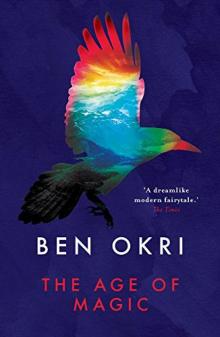 The Age of Magic
The Age of Magic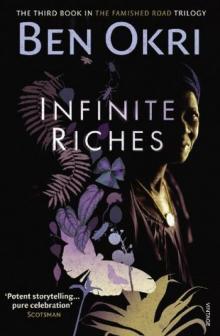 Infinite Riches
Infinite Riches Songs of Enchantment
Songs of Enchantment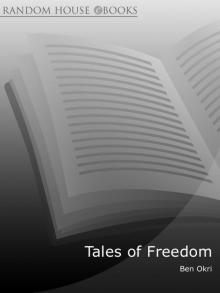 Tales of Freedom
Tales of Freedom Dangerous Love
Dangerous Love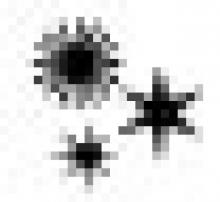 Starbook
Starbook The Famished Road
The Famished Road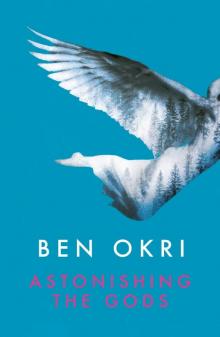 Astonishing the Gods
Astonishing the Gods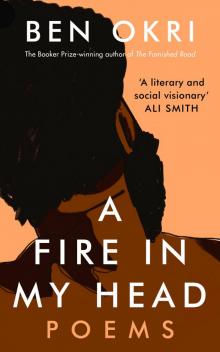 A Fire in My Head
A Fire in My Head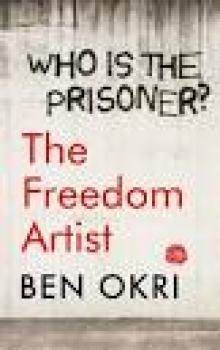 The Freedom Artist
The Freedom Artist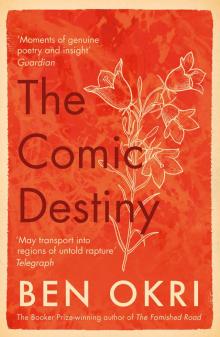 The Comic Destiny
The Comic Destiny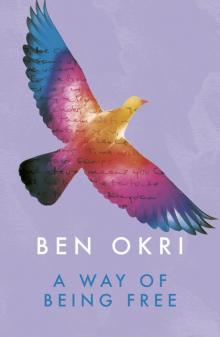 A Way of Being Free
A Way of Being Free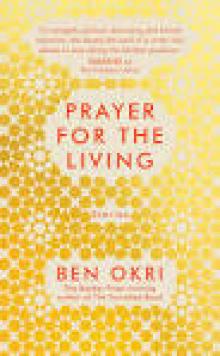 Prayer for the Living
Prayer for the Living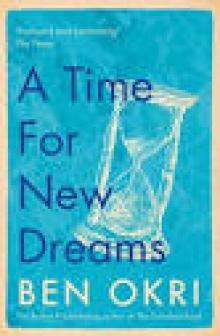 A Time for New Dreams
A Time for New Dreams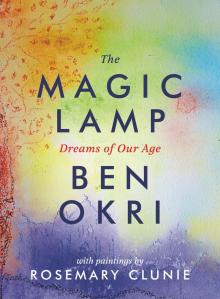 The Magic Lamp
The Magic Lamp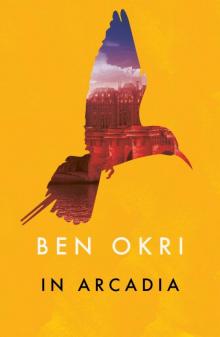 In Arcadia
In Arcadia